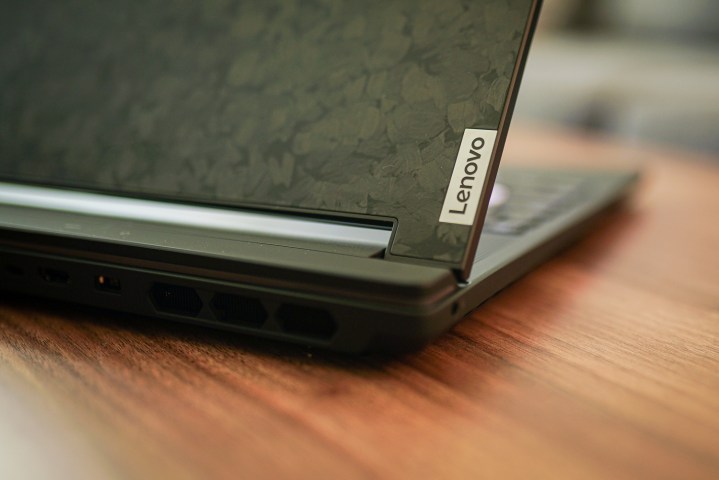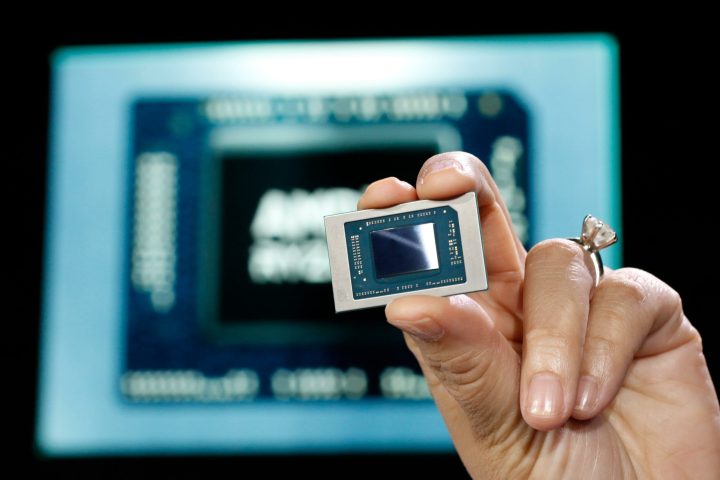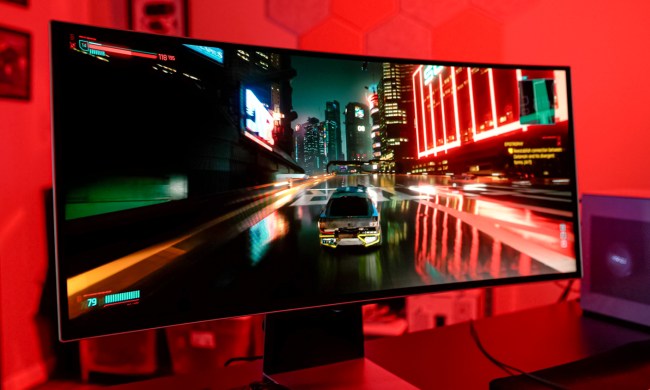There isn’t a tech company in the world that isn’t trying to fashion itself as an AI innovator right now. But as an established PC brand, Lenovo has an edge in that it can easily bake AI into its products and services.
Is there more to it than that, though? The brand’s PCs have already benefitted from several AI features. Lenovo showcased this at its Tech World 2023 conference, with futuristic concepts like the personal AI twin, which will intuitively leverage on-device information in an AI-assistant fashion, and allow you to protect personal data from the web at large. Such projects are another step toward the “AI PC,” as it’s being called.
I had a chance to speak with several executives from Lenovo and its partner, AMD, to ask about what defines an AI PC and when consumers can expect to see them on the market. While answers varied slightly, the consensus was sooner than you might think. Here’s what they had to say.
What exactly is an AI PC?

First, I spoke to Lenovo CEO, Yuanquing Yang, who gave the room full of journalists his definition of the AI PC.
“You can say the AI PC is hardware, software, is everything,” he stated. “In our view, it should comprise the foundation model. So, you must have a strong enough CPU, plus GPU to increase your PC or smartphone computing capability. The AI PC should be much more powerful. Not just powerful chips, foundational models, and operating systems, but also rich applications as well.”
Put simply, Lenovo sees the “AI PC” as a PC where AI is integrated at every level of the system, including both software and hardware. As an example, Lenovo Executive Vice President of Intelligent Devices Group, Luca Rossi, stepped in to mention the Legion brand of gaming notebooks as a form of AI PC that has already been on the market for over a year featuring the Ryzen AI chip.
“We apply certain AI techniques to improve the gaming experience. By making the machine understand what kind of usage model you’re going to do and then a machine fine tunes, the speed, the temperature, etc. So that is maybe a way to think about AI. Today, when we think about AI, everybody thinks about large language models, ChatGPT,” Rossi said.
I think it’s going to be one of the biggest things we’ve seen advancing the overall PC market.”
He added that Intel’s upcoming Meteor Lake launch in December will introduce an AI-embedded CPU that will propel a new wave of Lenovo products.
“When? This quarter, meaning the quarter we are in, there are already some things on the market. More will come with this Meteor Lake launch. And then it will be a journey. As with everything, I think we should not ask ourselves when is the day that AI PC arrives because that will be a journey with more devices, more upgrades coming that will be a journey that will last probably a couple of years,” he added.
AMD Head of OEM PC Jason Banta told journalists that he believes the AI PC will be the next technological revolution since the graphical interface, highlighting that the AI capabilities that already benefit the cloud and servers will be brought to the hardware level.

“Prior to this, you kind of just typed commands. It wasn’t quite as intuitive. You saw the graphical interface with the mouse, and it really changed the way you interacted the productivity. How you got things done, how it felt. I think AI PC is going to be that powerful if not more powerful,” Banta said.
He explained that the AI PC will personally assist you with tasks that are typically time-consuming and make them enjoyable, truly creating the productivity that has been marketed in PCs all along. He gave examples of the technology being beneficial for creative work, such as building artwork presentations or putting graphics together. Additionally, the AI PC will learn and adapt to your work style. Users should expect an emphasis on on-device security that can predict threats ahead of time.
“Doing it on the PC is going to save costs. Cloud AI is expensive. It’s something CIOs have to invest in. So, doing a lot of it directly on the PC is going to be advanced but also, it’s going to be more secure and more private. Being able to do that AI directly on your notebook, directly on your PC, the workstation, that’s going to bring a degree of privacy that you can’t get quite the same level in the public cloud today.”
“There’s a lot of advancements. It’s going to move very, very fast. I think it’s going to be one of the biggest things we’ve seen advancing the overall PC market truly revolutionary for our space,” he added.
The Lenovo lineup

Lenovo VP of the Workstation Business, Rob Herman noted that some of the company’s AI PCs include its ThinkPad Z13 Gen 2, Yoga Pro 7, ThinkPad T14s Gen 4, ThinkPad Z16 Gen 2, P620 Workstation, Legion Pro 5, Legion Go, and Legion Slim 5. These are among some of the best Lenovo laptops you can currently buy, all of which were on display during a talk with AMD executives.
“We already have some, we have some in the back. First of all, a workstation is an AI PC. It’s got so much GPU power. Then the processor inside and the memory that the processor empowers and enables. Those are all building blocks for driving AI development and driving the operation of AI,” he said.
Herman detailed that Lenovo has been expanding its workstation team to include client AI since 2017 and since then has been trickling down to more consumer-accessible products.
“We ship millions of AI PCs in the markets, and now, you’re seeing developers trying to understand it.
“So, we’re seeing NPUs and embedded AI engines coming into the PCs that are for every day,” he added.
Jason Banta reiterated that Lenovo has been progressive in introducing hardware products during the last CES that include neural processing and AI systems. Currently, it is the software developers and ecosystem that is catching up to hardware that is already prevalent.
“We ship millions of AI PCs in the markets, and now, you’re seeing developers trying to understand it, figure out how it works with their applications on a personalized level, making their apps better.”
He noted that Lenovo is working with big brand partners such as Microsoft to help advance the hardware and software, but other software developers are also interested in learning about developing AI technology around hardware, which will grow the market of the AI PC and level of AI capability simultaneously.
“The software ecosystem leveraging and keeping up with that is also speeding up quite a bit. I think you’re going to see, even if you buy an AI PC today, what you can do on it today that same PC compared to what you can do in two or three years as the software and the applications change, it’s going to be a dramatic step function on that same thing. It’s both the software and the hardware advancing in parallel in that timeframe,” Banta said.
AMD’s perspective

AMD CVP Client Marketing, Gaston Sandoval also spoke on the software development side of the AI PC and how it’s connected to the hardware. He gave as an example, Microsoft’s recent unveiling of its Copilot AI service, which is largely cloud-based. However, the company has a vision to bring elements of the system on-device too, so it can be optimized for hardware.
“One of the things that I’m very excited about is how we are approaching it on the software side to make it easy for the developers to start tapping into the new edges quicker and developing new applications faster because we recognize that we are not even scratching the surface,” he said. “The faster we can make that software stack easy for developers to play with. We want to start to see more applications not only for various specific business environments but also for general consumers. So that they can see general corpus applications coming up.”
Our goal is to make sure that developers worldwide are able to develop on our solutions.
AMD VP of Data Center Solutions Group, Robert Hormuth pointed out that as AI PCs become more commonplace many platforms may start to clash and there will be a need for standardization so they can work harmoniously.
“Doing this in a standardized way for the ecosystem is very important. Tell us you know PyTorch, TensorFlow, Onix. Our goal is to make sure that developers worldwide are able to develop on our solutions. We don’t want to implement things and then take them away,” he said.
“We want to make sure that we’re aligning with those standards because there’s so much development right now and everybody’s doing something different… As we do that, we’re making sure we’re doing that in ways that people can develop and develop quickly,” he added.
Companies like Lenovo and AMD consider themselves to be on the precipice of the AI PC. Having had building blocks in its enterprise space before now, seeing the success of the other brands has propelled Lenovo to showcase its progress and invest further. It will be fascinating to see how quickly the AI PC definition will update and solidify in the coming years, and if it truly lives up to the hype.




